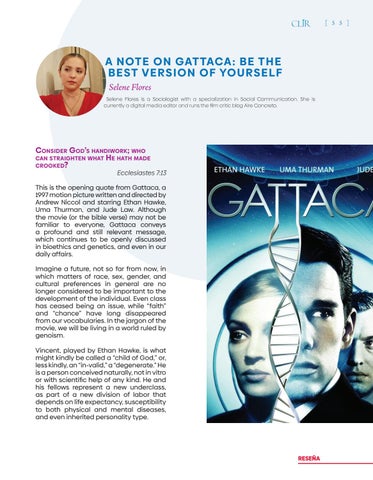[ 5 5 ]
A N OTE ON GAT TACA : BE T H E B EST VERSI O N O F YOU RSE L F Selene Flores Selene Flores is a Sociologist with a specialization in Social Communication. She is currently a digital media editor and runs the film critic blog Aire Concreto.
Consider God’s handiwork; who can straighten what H e hath made crooked?
Ecclesiastes 7:13
This is the opening quote from Gattaca, a 1997 motion picture written and directed by Andrew Niccol and starring Ethan Hawke, Uma Thurman, and Jude Law. Although the movie (or the bible verse) may not be familiar to everyone, Gattaca conveys a profound and still relevant message, which continues to be openly discussed in bioethics and genetics, and even in our daily affairs. Imagine a future, not so far from now, in which matters of race, sex, gender, and cultural preferences in general are no longer considered to be important to the development of the individual. Even class has ceased being an issue, while “faith” and “chance” have long disappeared from our vocabularies. In the jargon of the movie, we will be living in a world ruled by genoism. Vincent, played by Ethan Hawke, is what might kindly be called a “child of God,” or, less kindly, an “in-valid,” a “degenerate.” He is a person conceived naturally, not in vitro or with scientific help of any kind. He and his fellows represent a new underclass, as part of a new division of labor that depends on life expectancy, susceptibility to both physical and mental diseases, and even inherited personality type.
RESEÑA

















